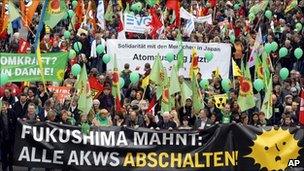Germany stages anti-nuclear marches after Fukushima
- Published

Germany's four biggest cities saw huge protests
Tens of thousands of Germans have taken part in what are thought to be the country's biggest-ever protests against nuclear power, in the wake of the Fukushima crisis in Japan.
Berlin, Hamburg, Munich and Cologne all saw huge rallies.
The marches were held on the eve of state elections in Baden-Wuerttemberg, where nuclear power is a key issue.
Japan is still struggling to stabilise the Fukushima plant, crippled by the earthquake and tsunami of 11 March.
Police in Berlin said more than 100,000 people had taken part in the march there - double the number anticipated by organisers, Ausgestrahlt (Irradiated).
Up to 40,000 were estimated to have been on the streets in Hamburg, Munich and Cologne.
"Today's demonstrations are just the prelude to a new, strong, anti-nuclear movement. We're not going to let up until the plants are finally mothballed," said Ausgestrahlt spokesman Jochen Stay.
German Chancellor Angela Merkel announced shortly after the Japanese earthquake that seven of Germany's oldest reactors would be shut down while safety checks were carried out. She also announced a three-month moratorium on extending the lives of others.
Baden-Wuerttemberg has been held by Ms Merkel's CDU party for nearly six decades, but the Greens and Social Democrats are expected to make a strong showing at the polls.
Parliamentary Green leader Renate Kuenast says Ms Merkel should have acted sooner on nuclear power.
"She already knew that planes could crash into a nuclear plant, that technical and human errors could occur. So Fukushima hasn't taught us anything we didn't already know," Ms Kuenast said.
One demonstrator, Ulrike Avenhaus, said: "Fukushima showed to everyone that there are risks after all and that we should probably reconsider whether our nuclear plants are as safe as politicians always tell us.
"Each and every nuclear plant is a source of danger and can potentially blow up. That's why they all need to be shut down."
Another, Monika Flemming, said: "I came here to call for nuclear reactors to be stopped because I firmly intend to die of old age rather than radiation poisoning."
Germany - which was hit by fallout from the 1986 Chernobyl nuclear disaster - has long had a large body of public opposition to nuclear power. It currently gets some 23% of its electric power from reactors.
- Published22 March 2011
- Published17 March 2011
- Published15 March 2011
- Published17 October 2010